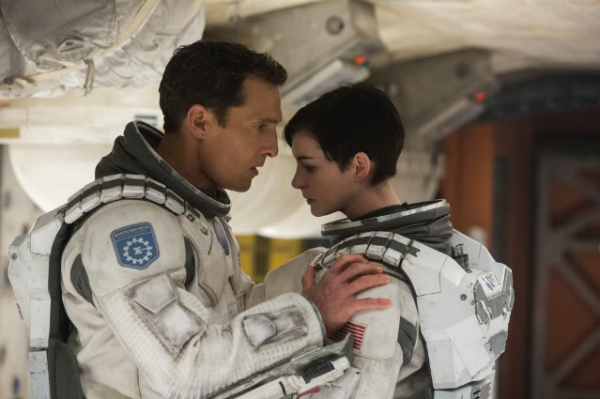
Interstellar, the new film from Christopher Nolan, arguably the only director working whose great ambition is met with equally great commercial success, is an epic science fiction story about humanity, love, and . . . science!
In the near future Wrath returns with even more grapes to put in the dust bowl, as humanity struggles to keep what little food they can grow from getting covered in dust before they are able to shove it into their moon-landing-denier maws. Enter reluctant farmer Cooper (McConaughey), a former pilot and engineer from back when those were jobs, a raspy low-talker who still looks up at the stars in earnest, and raised his genius daughter to do the same. Though his daughter Murph is unaware, the climate change is irreversible and the world is dying, which makes it all the more difficult and necessary for Cooper to leave his family to pilot a ship in search of habitable planets.
Herein lies the human element of Nolan’s gorgeously shot crash-course in Neil DeGrasse Tyson-approved meta-physics masquerading as space operatic special effects-travaganza. Depending on how long Cooper is gone, and how much gravity is around, time will act slower on Cooper than it does back on earth. What feels like an hour to him could be 7 years back home. The film explains this concept cogently (because relativity) and plays with it to great effect, and it is a credit to Nolan for his rare ability to interweave the emotional and the mathematical without drifting out of orbit into the realms of melodrama or pedantry. Mostly . . .
If this review reads as cavalier it is done purposefully in direct contrast to the tone of Interstellar (or any Nolan film for that matter). Nolan’s greatest flaw, in this reviewer’s opinion, is an almost suffocatingly heavy atmosphere of self-importance permeating his films. Why so serious, Christopher? Nolan does inject moments of levity, the greatest of which come from a preposterous, though ultimately cool robot called TARS, but without the foil of say, a Woody Harrelson type, to call him out on his bullsh__, Cooper’s constant existential philosophizing weighs me down when it should lift me up to ideas that could have been better conveyed had they not been spoken at all. That said, this small gripe isn’t near enough to derail Interstellar from setting the new standard in celestial cinematic depictions, grounded by the beautiful conundrum of what it is to be human.












